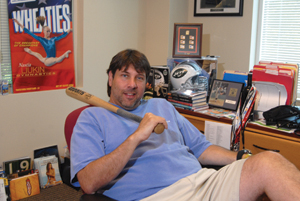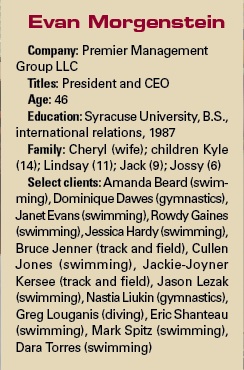Evan Morgenstein was drunk.
The Olympic agent was at the lobby bar of a Hilton in Dallas last month during the Team USA media summit, buying drinks and railing against the U.S. Olympic Committee’s exploitation of athletes. It hardly mattered that the people he was talking to worked there. That actually made him more exuberant.
 |
Morgenstein, shown in his Cary, N.C., office, has been known to show up at business meetings in a T-shirt, shorts and flip-flops.
STEVE WILSON
|
He spent $300 at the bar that night and irritated several people. But it was worth it. There’s nothing Morgenstein enjoys more than provoking the establishment. He’s practically built his career out of it. In the process, he’s become the most polarizing figure in the Olympics business.
Haters believe he is litigious, brash, inappropriate, dishonest and narcissistic. Fans believe he is smart, funny, loyal, blunt and a crusader for athletes’ rights.
About the only description both sides agree on is that he is scientifically unprofessional. He has been known to show up to business meetings wearing flip-flops, gym shorts and a tank top. He has threatened to beat up a rival agent for speaking negatively about his client. And he has a Twitter feed where he tweets about
overweight people on airplanes and tells newlyweds that 67 percent of marriages end in divorce.
Despite that, and largely because of it, Morgenstein has thrived as an agent as long as anyone in the Olympic world, and he has amassed a depth and scope of Olympians that rivals large agencies like Octagon, CAA and Wasserman Media Group. Last week, some 15 swimmers he represents, including Dara Torres, Amanda Beard, Jason Lezak and Eric Shanteau, as well as gymnast Nastia Liukin competed at the Olympic trials for a chance to go to London. Two other clients, diver David Boudia and beach volleyball player Phil Dalhausser, have already qualified for the Games.
This will be Morgenstein’s fourth Summer Games. Over the last 15 years, his niche athlete representation firm has evolved from a one-man shop in a 127-square-foot office in his house to an eight-person operation in a 3,700-square-foot office in Cary, N.C. He’s gone from representing what he and others considered second-tier Olympic athletes to handling the business of some of the biggest names in Olympic history, including Mark Spitz, Greg Louganis and Bruce Jenner. And he’s cut landmark deals like swimmer Cullen Jones’ reported $2 million, seven-year Nike swimwear agreement and Liukin’s partnership with Warner Bros. and JCPenney for a line of “Supergirl” apparel.
Through the years, he’s earned enough of a reputation as a salesman and marketer that celebrity chefs (Darren McGrady), professional fitness personalities (Jennifer Nicole Lee), coaches (American Swimming Coaches Association) and properties (USA Synchronized Swimming) alike have hired him. His business success serves as proof that being nice and well-mannered doesn’t necessarily win clients, but working hard, landing them deals and championing their rights does.
“He’s a fierce advocate for his clients even when it’s not in his best interest with sponsors and the media,” said Peter Carlisle, Octagon’s managing director of Olympics and action sports. “He’s smarter than people give him credit for. If he appears unfettered and reactive, there’s usually a reason for it.”
Torres, a five-time Olympian going into last week’s trials, put it this way: “He’s who he is and will say what he thinks. Every once in a while it’s not the best thing and you might cringe, but he’ll stand up for his athletes. That’s the great thing about him. … I feel I can trust Evan.”
And USA Swimming CEO Chuck Wielgus, who often finds himself opposite Morgenstein at the negotiating table, said, “He’s incredibly bright. He’s incredibly provocative. He’s incredibly entertaining. Some people find him incredibly difficult to work with, but like any good agent, he fights like a dog for his clients.”
Morgenstein’s detractors have a different perspective. It’s not that they don’t respect what he’s done for his clients. For the most part, they dislike his style.
“Agents I work with that I respect work for their athletes but at the end of the day want to get a deal done as fairly as possible,” said one agency executive, who declined to speak on the record out of concern that Morgenstein would use the quote as leverage in a future negotiation. “Everything with him has to include an argument. I’ve never thought of a deal we’ve done that went smoothly. He enjoys making it difficult.”
Morgenstein shrugged when he heard that.
“If you talk to someone at the IOC or the USOC, they don’t get me,” he said. “They’re a movement. They’re a family. Everyone comes into the house. My philosophy is: That’s not my house. I didn’t build it. I’m not invited. I’m the pariah. I’m the guy who wouldn’t shut his mouth. But I believe that they only will become a successful movement with the athletes when they give the athletes a seat at the table.”
Morgenstein landed in the Olympic world by coincidence. It was 1997, and he had recently opened his own sports consultancy, PMG Sports, to do marketing work for brands and represent athletes such as beach volleyball player Rob Heidger and NBA player Eric Mobley. He was in Atlanta with his first major client, Jumpsoles, for the world’s largest sporting goods trade show.
While he was sitting at the back of the brand’s booth, he watched a guy carrying three gold medals from the Atlanta Games walk up and ask for a free pair of shoes. As the guy turned to leave, Morgenstein ran after him and learned he was Josh Davis, the only man on the 1996 U.S. swim team to win that many golds.
Davis was there signing autographs for a hot tub company for $1,000. The paltry number floored Morgenstein, who had spent the previous two years representing NBA players at Fluid Sports & Entertainment, an agency founded by former New York Knick Charles Smith.
Morgenstein asked for Davis’ phone number and said he’d give him a call. Five days later, Morgenstein called and said he had three deals for Davis.
“How cool is that?” Davis said, recalling the episode. “In five months, [my other agent] had gotten me zero deals. In five days, Evan had gotten me three.”
Davis signed with PMG Sports immediately, and Morgenstein brought him deals with the shoe company Brooks, a safety swim vest sold on QVC, Speedo and others.
When Davis became captain of the 2000 U.S. Olympic swim team, he recommended that his teammates sign with PMG. It wasn’t long before Morgenstein was representing more than a dozen swimmers, most of them what Olympic insiders call tier-two athletes — not the Michael Phelpses or Mary Lou Rettons of the world, but ones like Brad Schumacher, Angel Martino and Lindsay Benko.
“He handled that whole middle of the pack group that really had to crawl for anything they could get,” said Skip Gilbert,who was USA Swimming’s chief marketer at the time. “He was able to literally bring money to athletes that you would be shocked they could earn.”
 |
Among Morgenstein’s clients are (clockwise, from top) Dara Torres, shown in an ad for HP; Amanda Beard, featured in People magazine in 2010; Cullen Jones, who has a reported $2 million apparel deal with Nike; and Nastia Liukin, whose “Supergirl” line of apparel is sold at JCPenney.
GETTY IMAGES (Jones) |
As he began to understand the Olympic system, he pushed USA Swimming to pay athletes more. His did so by describing swimmers as “indentured servants.” It was a term he said he chose because he knew it would bother Gilbert and other USA Swimming executives. When Gilbert, who didn’t remember the exchange, later told Morgenstein to back off or lose his access to the pool deck, Morgenstein felt he was onto something.
“That made me feel that I was right,” Morgenstein said. “If a guy like that who is in charge of a sport doesn’t appreciate that the athletes haveintrinsic value to the sport, then I’m going to keep signing athletes because you know what theathletes want? They want to believe that someone’s got their back.”
That attitude is at the heart of PMG’s culture and a major reason athletes have signed with Morgenstein through the years. He typically signs two types of athletes: those who have similarly forceful personalities and big dreams of deals and success, and those who are more mild-mannered and gravitate to his forceful personality because they know he will stick up for them.
Swimmer Tyler Clary, a silver medalist behind Ryan Lochte at the last two world championships, falls in the former category. He said he signed with Morgenstein in large part because, unlike three other agents he spoke to, Morgenstein knew about his times in the pool and understood his goals as a swimmer. He also believed Morgenstein would fight for him.
“I like the fact that he’s not afraid to piss people off if he thinks it’s necessary,” Clary said. “If he were in the business to be everybody’s friend, he wouldn’t be as good at what he does.”
Morgenstein’s style doesn’t work for everyone. Olympians Apolo Anton Ohno, Allyson Felix and Brendan Hansen all worked with him for a period and left. (All of them declined through representatives to speak for this story.) But most clients who sign with him have stayed for years.
A big reason for that is because of the deals he brings them. Torres is an example of what he is capable of doing. Prior to signing with him in 2005, she said she wasn’t getting any deals. Today she has 13 deals with brands ranging from McDonald’s and HP to AmLactin, a skin-care brand, and Sleep Innovations, a mattress manufacturer. She is expected to make more than $2 million in endorsements this year.
But not all of the deals he has brought to his athletes are clear-cut winners. In 2007, he put together a deal that saw swimmer Beard pose for Playboy. It’s an opportunity that Morgenstein said Beard chose to take, but it has had repercussions for both. It caused some blue-chip brands that had considered Beard for their roster of Olympians to ignore her, and it has caused parents of female Olympians to second-guess signing with Morgenstein, who has two daughters of his own, and tell him that they don’t want to see their daughter in Playboy.
“It helped and hurt my career in ways I’m still feeling,” Morgenstein conceded.
A lawsuit that 18 of Morgenstein’s athletes, including Jackie-Joyner Kersee, Torres and Spitz, filed earlier this year against Olympic sponsor Samsung has the potential to do the same thing. The lawsuit alleges the company did not have permission to incorporate the athletes’ names and photos into a Facebook application known as the Samsung Genome Project. No other agency or athletes have joined the lawsuit, but the PMG athletes, who Samsung removed from the Facebook app, stand by their decision to participate and said Morgenstein didn’t push them into the lawsuit.
Though his name’s not on the lawsuit, Morgenstein knows he will be the one to deal with the fallout of it. Olympic sponsorship executives will wonder if they can trust him in the future. If his athletes are willing to sue Samsung, why wouldn’t they sue Coke or Visa or McDonald’s? But that’s beside the point, in Morgenstein’s eyes.
“It’s not about me,” he said. “I never filed a lawsuit. … I never coerced anybody to file a lawsuit. Everyone needs to take a deep, big-boy breath and realize these athletes aren’t the cattle they think they are and recognize that each one of them deserves the respect of a conversation if they want to be involved [in a marketing initiative].”
Twitter has become Morgenstein’s megaphone of choice in his crusade for Olympians’ rights. He has just 2,600 followers, but many of his 14,000 tweets raise questions about the IOC or USOC. Last week, as the IOC ramped up its investigation into black-market ticket sales for the London Games, he posted this tweet.
“Find it interesting that the IOC is so concerned about athletes #tweeting yet their own members r scalping tickets for a fortune!”
For Morgenstein, provoking the establishment will never get old.






